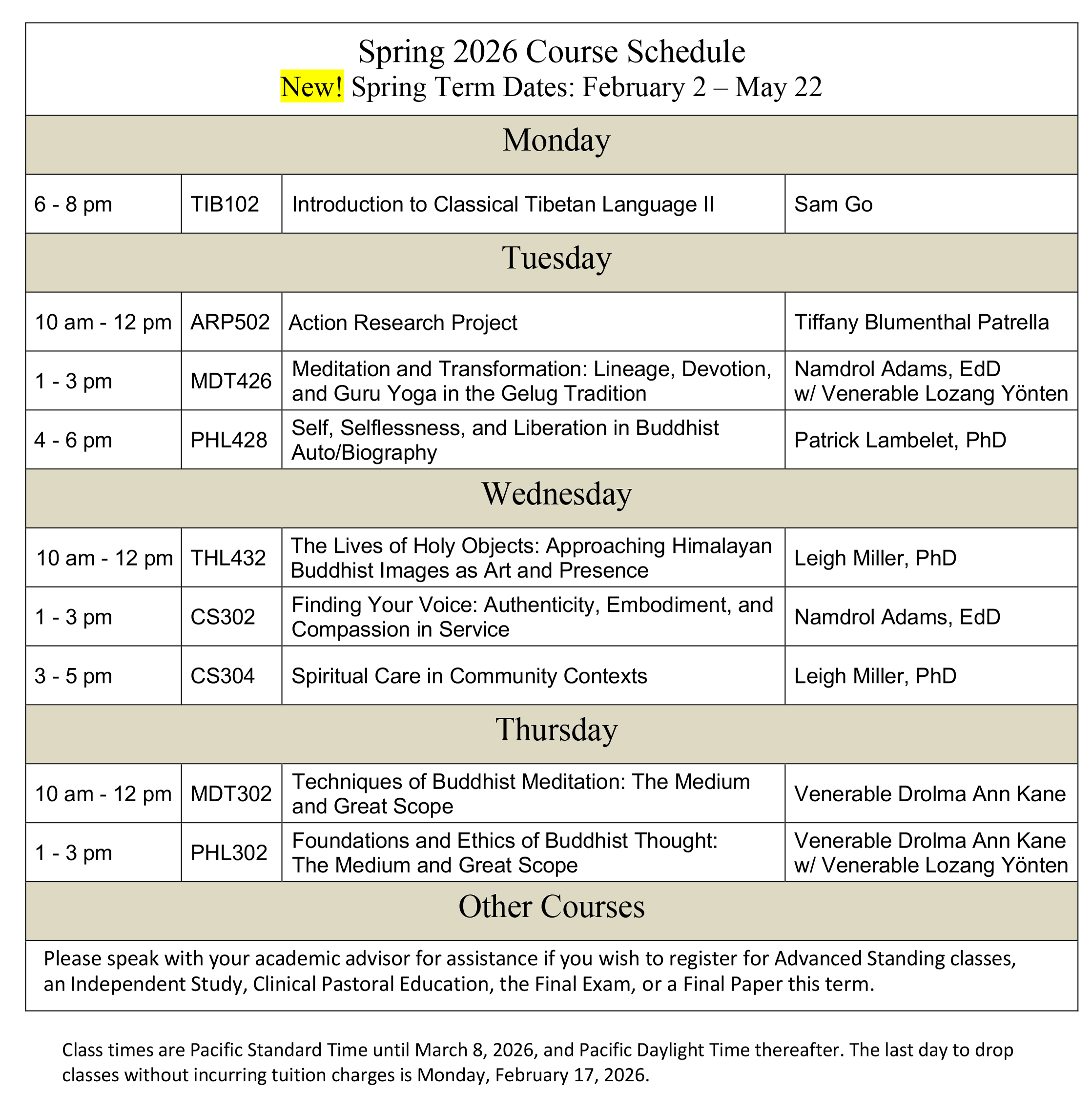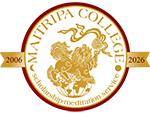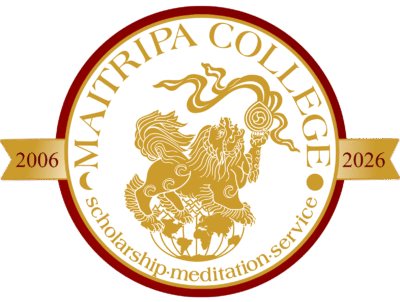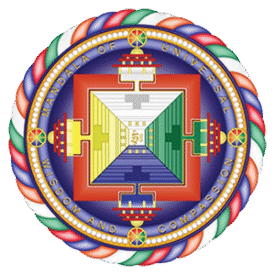Spring 2026 registration is still open;
course descriptions are at the bottom of this page
and faculty bios are here
Click here for academic year calendar

ARP502: Action Research Project (2 credits)
The Action Research Project is a form of integrative and collaborative research, reflection, and writing. Students become researchers by choosing a principle question and working with faculty mentors to design a research project. The action researcher is at the center of the inquiry, change, and learning that comes through the process. Action research impacts the researcher on personal and professional levels, and intends to positively impact others as well. ARP502 students will hone their research question, identify their positionality, build a literature review, understand research ethics standards and write consent forms or other ethics documents as needed, explore research methods and describe their selected tools and methodologies, and write a research proposal. The course is successfully completed upon the approval by a committee of their research project proposal. Research plans should be then implemented between the proposal approval and enrollment in ARP504, usually at least six months.
CS302: Finding Your Voice: Authenticity, Embodiment, and Compassion in Service (2 credits)
This course invites students to explore how authentic expression and spiritual leadership arise from embodied presence, reflective awareness, and a compassionate understanding of self and others. Part of the Service Pillar courses at Maitripa College, students will engage both inner and outer dimensions of voice—cultivating the internal resources that sustain service while practicing ways of expression that are grounded, relational, and genuine. Drawing on traditional, historical, and contemporary models of leadership alongside selected modern approaches to cultivating sustainable care and awareness, the course encourages students to discover how their voice can become a natural expression of insight and service in the world.
CS304: Spiritual Care in Community Contexts (2 credits)
This course will explore “ministerial arts” and “pastoral care” in support of Buddhist/spiritual communities, with a particular emphasis on cultivating the inner and outer qualities and resources of skillful community servant leadership. Students will engage in self-assessment for enhanced awareness of our impact on others and increase awareness of how trauma, bias, power and privilege, ethics and so forth impact spiritual communities. This course will introduce theories paired with application in mentored exercises, from studying how a healthy practice environment fosters spiritual formation and growth, to offering and assessing spiritual care conversations, facilitating group practices or support groups, delivering religious education with a pedagogical framework, and writing and delivering a dharma talk.
MDT302: Techniques of Buddhist Meditation: The Medium and Great Scope (2 credits)
This course will continue with instruction in meditation based on the foundations established in MDT 301. The course will be taught in an interactive format, allowing students the opportunity to learn specific meditations as directed by the instructor, practice them, and discuss their experiences in class. The subject matter will parallel the topics of Buddhist philosophy as taught in PHL302. Part of this class will include regular meditation sessions out of class, the keeping of a sitting journal, and the opportunity for discussion on the effect of these practices on the individual’s mind. If desired, the committed student will have the opportunity to work with the instructor to design a personal meditation practice.
MDT426: Meditation and Transformation — Lineage, Devotion, and Guru Yoga in the Gelug Tradition (2 credits)
This course introduces the Guru Puja (Lama Chöpa) and related practices as complete contemplative systems for personal transformation in the Gelug tradition. Through readings, discussion, meditation, and reflection, students examine how these practices integrate devotion, ethical commitment, analytical inquiry, and meditative insight into a unified path of spiritual and psychological growth. Combining historical and philosophical study with direct contemplative experience, the course explores how lineage and the teacher–student relationship function as relational and ethical frameworks for transformation, with particular attention to discernment, responsibility, and agency within asymmetrical relationships. Working with selected verses and practices, students investigate how devotion and reasoning operate together as technologies of transformation and consider how these dynamics can be responsibly engaged in contemporary educational, spiritual, and service contexts.
PHL302: Foundations and Ethics of Buddhist Thought: The Medium and Great Scope (2 credits)
This class surveys the foundational philosophical ideas of the Buddhist tradition as presented by the great pandits of India and commented upon by the Tibetan inheritors of the Indian Buddhist tradition. The course will make use of philosophical treatises (primary sources in translation), literature, and historical analysis to present the foundations of Buddhist philosophy. Readings may include selections from Vasubandhu’s Abhidharmakosha, Dharmakirt’s Pramanavarttika, the Abhisamayalamkara (attributed to Maitreya), Shantideva’s Guide to the Bodhisattva’s Way of Life, and “Seventy Topics” from the Ornament of Clear Realizations by Maitreya, as well as modern scholarly analysis of the same. There will be a particular focus on the readings as they relate to the medium and great scope of the Lamrim (Stages of the Path genre) as presented by the Tibetan scholar Je Tsongkhapa and others. Students will gain a strong foundation in Buddhist philosophy including key topics that relate to the medium and great scopes (ways of describing spiritual practitioners’ stages of motivation and aims) such as: cause and effect, the potential for enlightenment, and the structure of existence according to the Buddhist world view. Students will also gain a strong understanding of the Buddhist philosophic underpinnings of critical concepts such as: loving kindness, great compassion, and abandoning the mind of self-cherishing, the mind of enlightenment, the six perfections, and an in-depth examination of the path of a bodhisattva.
PHL428: Self, Selflessness, and Liberation in Buddhist Auto/Biography (2 credits)
This course will explore the genres of biography and autobiography in Buddhist traditions, with particular emphasis on Tibetan figures. Spiritual biographies have long played a crucial role in Buddhist traditions, from the life stories of the Buddha (avadānas and jātakas) to the liberation stories (rnam thar) of Tibetan saints, such as Milarepa, Padmasambhava, Yeshé Tsogyal, and Tsongkhapa, to modern figures. They serve not only as (quasi-)historical accounts of their lives and times, but as sources of inspiration and teaching for Buddhists, illuminating key points of Buddhist doctrine and philosophy. We will consider Buddhist auto/biography through multiple frameworks, focusing especially on what these “stories” tell us about Buddhist notions of self, karma, identity, reality, and the Buddhist path. We will begin the course with an overview of theoretical studies of biography and narrative before reading and analyzing a variety of examples of Buddhist biographical literature in translation.
THL432: The Lives of Holy Objects: Approaching Himalayan Buddhist Images as Art and Presence (2 credits)
This course explores the lives of Buddhist paintings, sculptures, and ritual objects as they move through creation, consecration, enact religious support for dharma practice, and circulate across Himalayan Buddhist worlds and beyond. Through foundational knowledge study of traditional sacred spaces, iconography, and artistic lineages, alongside fieldwork in exhibition and local settings, participants investigate how holy objects mediate connections between practitioners and enlightened beings and are embedded in social worlds. We explore how images relate to dharma practice, in doctrine, liturgy, and embodied experiences of pilgrimage, mudra, and meditation. Then, through case studies of objects in Western collections and field trips to a Himalayan Buddhist art exhibition, students engage current debates on provenance, repatriation, and decolonial methodology. Attention is given to how these images travel from regional ateliers to global museums and through shifting histories, meanings, and ethical questions surrounding these objects’ preservation, displacement, display and cultural exchange. Combining contemplative perspectives with scholarly research, students will finally consider ethical stewardship in both religious and secular settings as we document and interpret objects within the Maitripa College dharma community, applying decolonial and spiritual approaches. Integrating study and practice, students will “meet”, research, and document Tibetan Buddhist objects within this community’s sacred space, contributing to an ethically grounded project for multivocal documentation, education, and connection with holy objects that honors the complexity and living significance of Buddhist sacred objects, guiding their ethical study, care, religious use, and representation.
TIB102: TIB102: Introduction to Classical Tibetan Language II (2 credits)
Continued study of Tibetan grammar, syntax, and vocabulary of Classical Tibetan language


